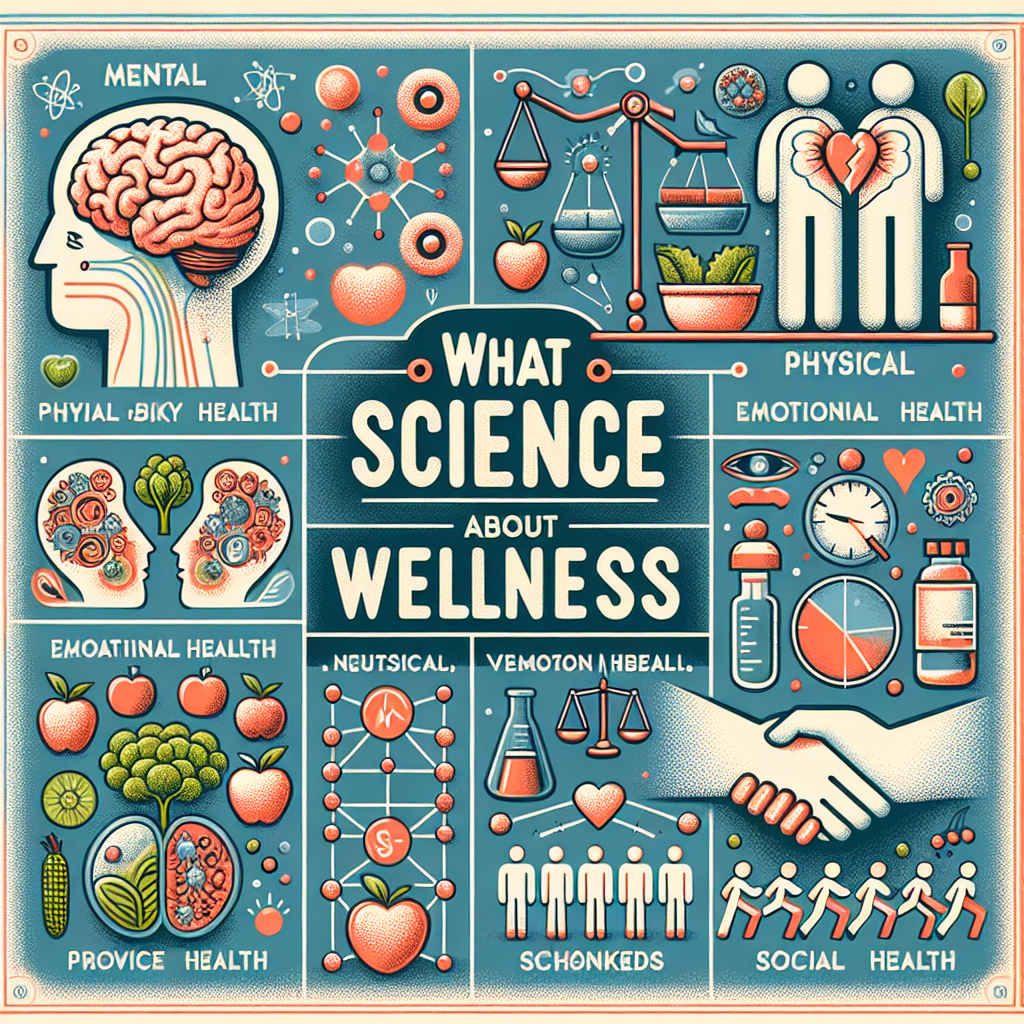What Science Says About Wellness

Discover what science says about wellness! Dive into the research and learn how to enhance your health and wellbeing. Click here to start your journey towards vibrant vitality.
Exploring the Scientific Connection Between Physical Activity and Wellness
Wellness, a term that has gained significant traction in recent years, is often associated with a holistic approach to health that encompasses physical, mental, and emotional well-being. While the concept of wellness is multifaceted, one of its key components is physical activity. The scientific community has long recognized the importance of regular exercise in maintaining good health, but recent research has shed new light on the profound connection between physical activity and overall wellness.
Physical activity, as defined by the World Health Organization, is any bodily movement produced by skeletal muscles that requires energy expenditure. This includes activities undertaken while working, playing, carrying out household chores, travelling, and engaging in recreational pursuits. The benefits of regular physical activity are manifold and extend beyond the obvious physical health advantages.
Scientific studies have consistently shown that regular physical activity can reduce the risk of various health conditions, including heart disease, stroke, type 2 diabetes, and even certain types of cancer. It also plays a crucial role in weight management, bone health, and muscle strength. But the benefits of physical activity are not limited to physical health alone. It also has a significant impact on our mental and emotional well-being.
Research has found that physical activity can boost mood and improve mental health by reducing symptoms of depression and anxiety. This is largely due to the release of endorphins, often referred to as ‘feel-good’ hormones, during exercise. These natural mood lifters help alleviate stress and promote a sense of well-being. Moreover, regular physical activity can improve sleep quality, another critical aspect of overall wellness.
The connection between physical activity and cognitive function is another area that has been extensively studied. Regular exercise has been found to enhance cognitive abilities, including memory and attention. It also helps delay cognitive decline in older adults, thereby playing a crucial role in maintaining brain health.
The science behind the relationship between physical activity and wellness is compelling. However, it’s important to note that the type, intensity, and duration of physical activity can influence its health benefits. For instance, moderate-intensity aerobic activity, such as brisk walking, for at least 150 minutes a week, is recommended for substantial health benefits. This can be complemented with muscle-strengthening activities on two or more days a week.
While the scientific evidence supporting the benefits of physical activity is robust, it’s also important to remember that wellness is a holistic concept. It’s not just about physical health, but also about mental and emotional well-being. Therefore, a balanced approach that includes regular physical activity, a healthy diet, adequate sleep, stress management, and strong social connections is essential for achieving overall wellness.
In conclusion, the scientific connection between physical activity and wellness is undeniable. Regular physical activity is a powerful tool that can significantly enhance our overall well-being. However, it’s just one piece of the wellness puzzle. A comprehensive approach that addresses all aspects of health is crucial for achieving and maintaining wellness. As the saying goes, “Health is a state of body, wellness is a state of being.” So, let’s strive for wellness, not just health.
The Impact of Nutrition on Wellness: A Scientific Perspective

Wellness, a term that has gained significant traction in recent years, is a holistic integration of physical, mental, and spiritual well-being. It is a state of living a healthy lifestyle that goes beyond merely being free from illness. One of the key components of wellness is nutrition, and science has a lot to say about its impact on our overall well-being.
Nutrition, as defined by the World Health Organization, is the intake of food considered in relation to the body’s dietary needs. It is an essential building block of wellness and plays a crucial role in maintaining optimal health. The science of nutrition delves into how the body metabolizes food, how it uses nutrients for growth and repair, and how it responds to dietary patterns over time.
Scientific research has consistently shown that a balanced diet is vital for maintaining good health and well-being. A diet rich in fruits, vegetables, whole grains, and lean proteins can provide the body with the necessary nutrients it needs to function optimally. These nutrients include vitamins, minerals, and antioxidants that protect the body against diseases.
Moreover, the science of nutrition has also shed light on the link between diet and chronic diseases. Studies have shown that unhealthy dietary habits, such as consuming high amounts of processed foods, sugars, and unhealthy fats, can lead to obesity, heart disease, diabetes, and certain types of cancer. On the other hand, a diet rich in fiber, lean proteins, and healthy fats can help prevent these diseases and contribute to overall wellness.
In addition to physical health, nutrition also impacts mental health. The brain, like any other organ in the body, requires nutrients to function properly. Research has shown that certain nutrients, such as omega-3 fatty acids, B vitamins, and antioxidants, can support brain health and improve mood and cognitive function. Furthermore, a growing body of evidence suggests that there is a strong link between gut health and mental health. The gut microbiome, which is influenced by diet, can affect brain function and mental health through the gut-brain axis, a bidirectional communication system between the gut and the brain.
The science of nutrition also extends to the realm of sleep, another critical component of wellness. Certain nutrients, such as magnesium and tryptophan, have been found to promote sleep by helping regulate the body’s sleep-wake cycle. Conversely, consuming large amounts of caffeine and alcohol can disrupt this cycle and lead to poor sleep quality.
In conclusion, the science of nutrition provides a wealth of knowledge on how diet impacts wellness. It underscores the importance of a balanced diet in maintaining physical health, preventing chronic diseases, supporting mental health, and promoting good sleep. It also highlights the need for personalized nutrition, as individual nutritional needs can vary based on factors such as age, gender, activity level, and genetic makeup. Therefore, to achieve optimal wellness, it is essential to understand and apply the principles of nutrition science in our daily lives.
Understanding the Science Behind Mindfulness and Mental Wellness
The concept of wellness has been gaining significant traction in recent years, with an increasing number of individuals seeking to understand and improve their overall well-being. While wellness is often associated with physical health, it also encompasses mental and emotional health. In this regard, mindfulness, a practice rooted in ancient Buddhist philosophy, has been recognized by science as a powerful tool for enhancing mental wellness.
Mindfulness, in its simplest form, is the practice of maintaining a moment-by-moment awareness of our thoughts, feelings, bodily sensations, and surrounding environment. It involves acceptance, meaning that we pay attention to our thoughts and feelings without judging them—without believing, for instance, that there’s a “right” or “wrong” way to think or feel in a given moment.
Scientific research has shown that mindfulness can have a profound impact on mental wellness. A study published in the Journal of Behavioral Medicine found that mindfulness can reduce stress and improve mental clarity. The practice encourages individuals to focus on the present, which can help reduce anxiety and prevent the onset of depressive symptoms.
Moreover, mindfulness has been found to alter the structure of the brain itself. A groundbreaking study conducted by Harvard University revealed that mindfulness can increase the density of the hippocampus, a part of the brain associated with memory and learning. It also showed a decrease in the amygdala, a region connected to anxiety and stress. These changes in brain structure can lead to improved emotional regulation and response to stress, further promoting mental wellness.
In addition to mindfulness, other practices such as regular exercise, a balanced diet, and adequate sleep also play crucial roles in mental wellness. Regular physical activity has been shown to reduce symptoms of depression and anxiety. It stimulates the production of endorphins, chemicals in the brain that act as natural mood lifters.
A balanced diet, rich in fruits, vegetables, lean proteins, and whole grains, can also contribute to mental wellness. Certain nutrients, like omega-3 fatty acids found in fish and vitamin B found in some vegetables, are known to promote brain health. Limiting intake of refined sugars and processed foods can help maintain stable blood sugar levels, reducing mood swings and promoting overall mental wellness.
Sleep, often overlooked, is another critical aspect of mental wellness. During sleep, the brain works to consolidate memories and process information from the day. Lack of sleep can impair these functions, leading to decreased cognitive abilities, mood swings, and increased susceptibility to mental health disorders.
In conclusion, the science behind wellness underscores the importance of a holistic approach. Mindfulness, regular exercise, a balanced diet, and adequate sleep are all integral components of mental wellness. By understanding and implementing these practices, individuals can enhance their mental well-being and overall quality of life.
While the journey to wellness is a personal one, the science provides a roadmap that can guide individuals towards improved mental health. As research continues to evolve, it is clear that the integration of mindfulness and other wellness practices into daily life can have profound effects on mental wellness, offering promising avenues for those seeking to enhance their overall well-being.